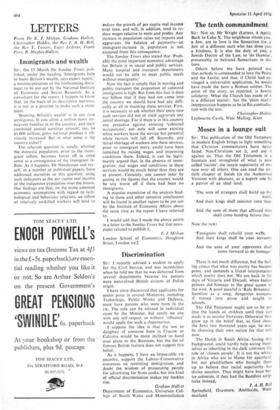LETTERS
From Dr E. J. Mishan, Graham Hallett, Christopher Hohler, the Rev J. A. H. Bell, the Rev T. Towers, Lajos Lederer, Frank Piers, R. Hughes-Hallett.
Immigrants and wealth
Sir: On 15 March the Sunday Times pub- lished, under the heading 'Immigrants help to boost Britain's wealth, says expert report,' a misinterpretation of the forthcoming docu- ment to be put out by the National Institute of Economic and Social Research. As a consultant for the report, I happen to know that, on the basis of its descriptive statistics, it is not in a position to make such a state- ment.
'Boosting Britain's wealth' is in any case ambiguous. If you allow a million more im- migrant families in to the country, and their combined annual earnings amount, say, to £1,000 million, gross national product is ob- viously increased. But in what sense is the country richer?
The relevant question is. surely, whether the domestic population, prior to the immi- grant inflow, becomes better off in some sense as a consequence of the immigrant in- flow. As it happens, Dr Needleman and my- self, in a number of published papers, have addressed ourselves to this question, using such indicators as the per capita real income of the indigenous population over the future. Our findings are that, on the more common economic assumptions with regard to tech- nological and behaviour relations, an inflow of relatively unskilled workers will tend to reduce the growth of per capita real income over time, and will, in addition, tend to re4 duce wages relative to rents and profits. Any increase in population raises net imports and aggravates the balance of payments—an immigrant-increase in population is not excepted from this consequence.
The Sunday Times also stated that 'Prob.' ably the most important economic advantage for Britain is in social and public services. Many hospital and transport departments would not be able to meet public needs without immigrants.'
Now the fact is simply that in nursing and public transport the proportion of coloured immigrants is high. But from this fact it does not Talow that if they had not come into the country we should have had any diffi- culty at all in manning these services. First, it is necessary to ask whether their entry into such services did not of itself aggravate any initial shortage. For if there is in this country any prejudice against entering 'coloured occupations', not only will some existing white workers leave the service but potential white recruits will fall off. Secondly, any initial shortage of workers into these services, prior to immigrant entry, could have been remedied by raising wages and improving conditions there. Indeed, it can be legiti- mately argued that, in the absence of immi- gration, real wages and conditions in these services would be much better than they are at present. Certainly, one cannot infer by gazing at the figures that the country would be any worse off if there had been no immigrants.
A popular exposition of the analysis lead- ing to these and other tentative conclusions will be found in another report to be put out by the Institute of Economic Affairs about the same time as the report I have referred to.
I would add that I made the above points in a letter to the Sunday Times but that news- paper refused to publish it.
E. J. Mishan London School of Economics, Houghton Street, London wc2






































 Previous page
Previous page